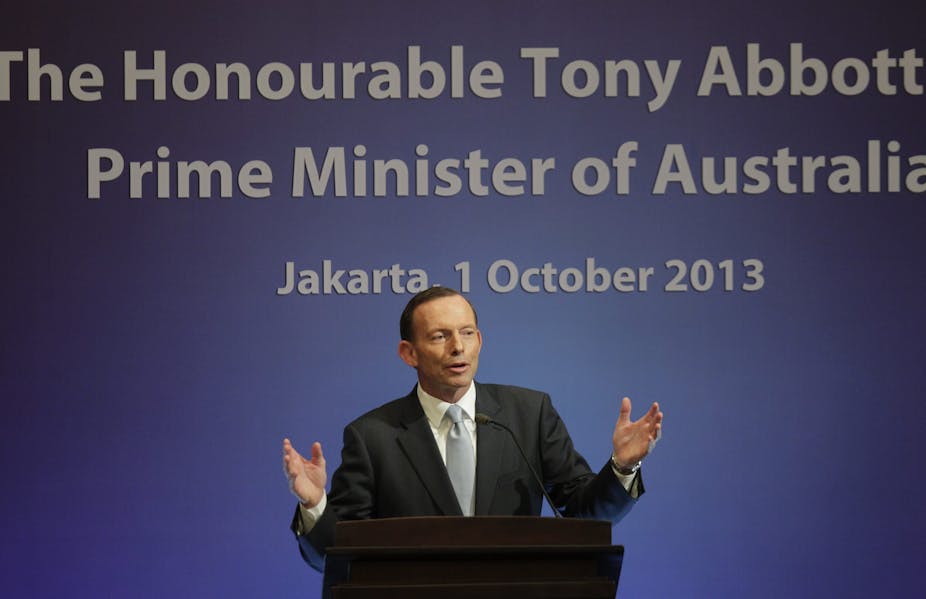Tony Abbott cleared the hurdle posed by his Indonesian visit like the steeplechaser who navigates the brush fence safely despite some twigs flying.
Whatever the importance of other matters, the trip’s central issue had to be the boat arrivals. Abbott knew he must tone down the Coalition’s pre-election stridency. The militant stress on Australia’s sovereignty needed to become an emphasis on co-operation and respect for Indonesia’s sovereignty.
Did policy as well as tone change? Probably, at least up to a point. The plan to buy Indonesian fishing boats is unlikely to have a future; it was ridiculous anyway.
A broken promise to Indonesian boat owners? It will be interesting to see whether Immigration Minister Scott Morrison defines it as a secret operational matter when someone eventually asks him how many boats we’ve bought and where they are.
If paying locals for intelligence goes ahead, no one will talk about it. Abbott says that money “is available for our joint purpose to stop the boats”.
As for turning back boats, the PM was quick to point out he hadn’t previously been saying the Coalition would “tow” them back. Thanks to the media blackout we’ll not officially hear whether any boats are turned; we’d have to rely on reports from Indonesia (which seems freer with information than the Australian government) or leaks from the Navy.
The new government has already had two cases of the Indonesians sending vessels into international waters to accept back people Australian ships have rescued. This has happened before but that it has occurred so early is being seen as positive.
There had been some diplomatic signals prior to the trip that the Indonesians were anxious to get the relationship off to a good start, and that President Susilo Bambang Yudhoyono was willing to listen with an open mind to the PM about boats, despite the oft-stated Indonesian unhappiness with the Coalition policy, especially on turn backs.
But things went somewhat off course when Foreign Minister Marty Natalegawa sent his tough message after meeting counterpart Julie Bishop in New York. Obviously feeling she hadn’t properly represented their conversation, a full note of the discussion was put out, to make clear Indonesia’s position.
Abbott knew he had to tread carefully. He took Trade and Investment Minister Andrew Robb and sensibly left at home Morrison, who has been the attack dog on border security. Morrison will later have to negotiate details, which will be a test for him.
Under questioning in Jakarta, Abbott insisted that “of course we stand by our policies” but the main thing was “to work effectively to stop the boats”.
Here’s Abbott the pragmatist. In opposition the boat rhetoric was the thing; in government, you must get the results.
Abbott has two imperatives: he has to establish a good working relationship with Indonesia (and have it strong before next year’s presidential election) and he must stem the asylum seeker arrivals. As he said, “In the end that is all that really counts - have we stopped the boats?”
The Labor opposition might accuse Abbott of walking back from his pre-election language, but for him this issue has changed from a political brawl with Labor to an urgent practical need. All arrivals are supposed to be sent offshore within 48 hours. Facilities at Manus Island and Nauru are being expanded but obviously capacity is not infinite.
People won’t be processed and resettled as quickly as they are arriving. And the question of where those found to be refugees are settled will soon arise. These countries can’t and won’t take unlimited numbers.
That’s apart from the problems that will spring up sooner or later with asylum seekers waiting to be processed. Riots become almost inevitable with large numbers confined for long periods in bad environments.
The boats have slowed, thanks primarily to Kevin Rudd’s drastic PNG solution. More than 4000 arrivals in July fell to under 1600 in August and that halved in September.
But this is still a big number. Politically Abbott has stretched out the timetable for stopping the boats but actually, to avoid the possibility of serious trouble, he has to reduce arrivals to manageable proportions quite quickly.
Now that he has fulfilled his promise to go to Indonesia and achieved as much as he could have expected, Abbott is off on some less demanding international appearances.
He will spend all next week away, first at the APEC summit in Bali and then at the East Asia summit in Brunei. Just as after the 2010 election when she was still a quite new PM Julia Gillard got a quick introduction to many leaders at these meetings, Abbott is having the same induction onto the world stage, and to summitry.
It’s less demanding than bilateral trips where you need “announceables” and the judgements can be harsher. Summits enable a lot of individual meetings to be packed into a short time and also get a leader up to speed on key issues more effectively than the formal brief. (Whether he will get to meet Barack Obama next week remains uncertain, depending what happens with the US shutdown.)
Abbott will also go to the November Commonwealth Heads of Government Meeting in Sri Lanka; it is controversial because of the human rights issues there but he confirmed his attendance soon after the election.
By Christmas he will have had a snap course in international diplomacy. But this first trip will remain the most important of this year, with its ultimate success rating depending on what happens later with the boats and the relationship generally.
Andrew Leigh is the guest on the Politics with Michelle Grattan podcast, available below, by rss and on iTunes.

